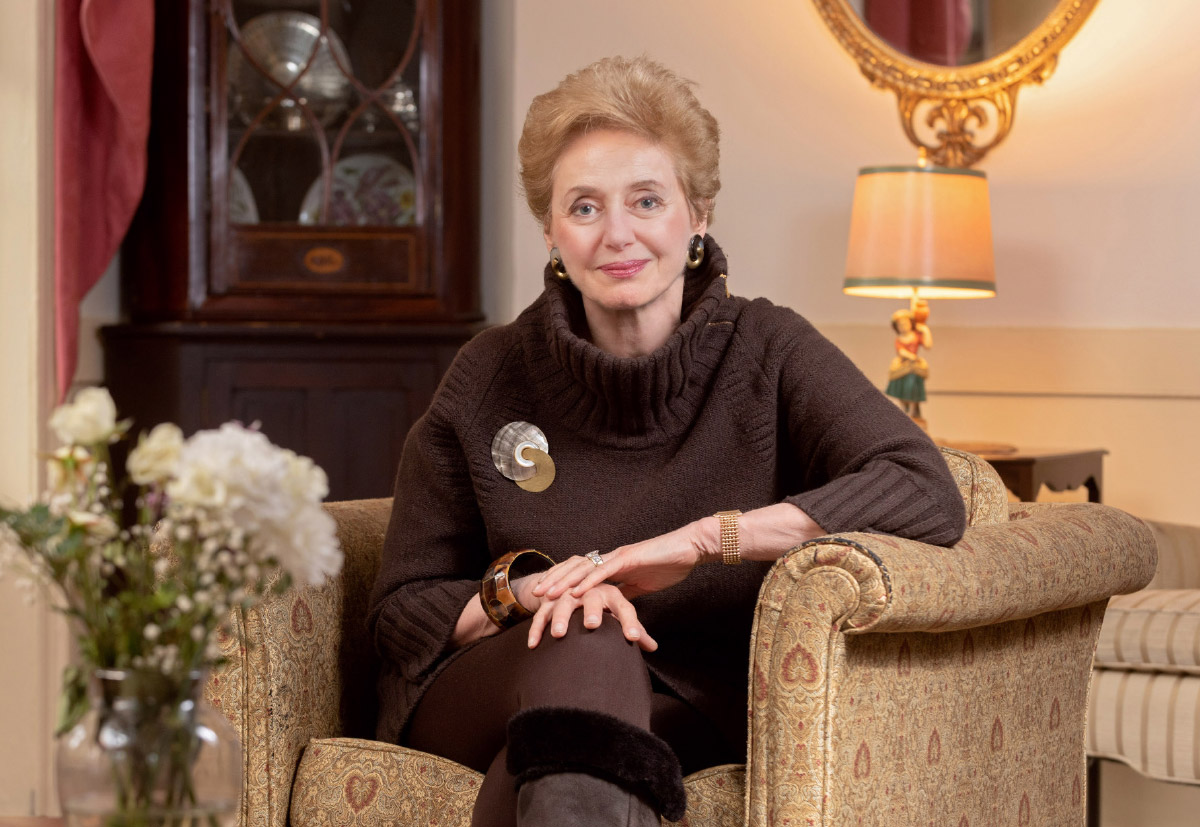

Bridging the Divides

Vassar has launched a new initiative, Engaging Differences, in the Office of Religious and Spiritual Life and Contemplative Practices (RSLCP) to help members of the campus community heal and learn from each other in these polarizing times.
The project is funded by Dr. Georgette F. Bennett ’67, founder of the Tanenbaum Center for Interreligious Understanding, which works to combat religious prejudice, confront hate, and build respect for religious differences. Bennett sees her support of Engaging Differences as a continuation of her decades-long efforts toward inter-group understanding and conflict resolution. She hopes the project will help students—whether religious or secular—learn to acknowledge the pain of others. “That’s the beginning of listening and that’s the beginning of building trust,” she explained. “That’s the beginning of healing.”
The RSLCP team wants students to be able to talk to each other about how they’re intellectually, emotionally, and spiritually processing a myriad of personal, cultural, national, or international issues. “We’re trying to think quite broadly, not only in terms of one particular set of issues or countries,” said Associate Dean of the College for RSLCP Samuel Speers. “We want students’ needs, experiences, and concerns to drive the project as we facilitate and provide appropriate resources. We want students to feel comfortable expressing their messy, full selves.”
“We don’t want to make the assumption that because you have a certain religious identity, you have a certain political identity or specific political allegiances,” said Rabbi Bryan Mann, Assistant Director of RSLCP and Rachlin Director of Jewish Student Life.
Speers, Mann, and Saba Ali, Advisor for Muslim Student Life, are implementing a three-pronged approach. The first two are inter- and intra-group dialogue within and among student groups.
“It can seem counterintuitive to be working to strengthen relationships within a religious community, while also building inter-group dialogue,” Ali noted. Vassar’s Muslim and Jewish students come from many backgrounds and hold a range of perspectives,” she said, “and there is room within those groups to uncover and understand differences.”
On a small campus like Vassar, students live, eat, take classes, and work in student groups or on class projects together. As RSLCP builds bridges across religious communities, students practice skills that help them to sustain the conversations they are already having. Students learn from each other how to organize religious communities and incorporate restorative practices that turn potential moments of conflict into opportunities for connection.
Mann said students drive the kind of interreligious community they want to see on campus. He points to a joint Passover Seder/Iftar meal students organized in the spring of 2023 that turned out to be the largest interreligious program of the year.
Students share issues they may be facing and events they are planning at semi-regular dinners and gatherings that include members of student organizations, such as the Buddhist Sangha, Vassar Catholic Community, Vassar Muslim Students Association, and many others.
Salih Elnour Salih Awouda ’25, a RSLCP intern, was one of the organizers of a biweekly interreligious gathering open to all students regardless of their faith or spiritual beliefs. Awouda says participants “come together and discuss both religious and secular topics, tying them back to their personal experiences.
“We’ve had a lot of fruitful discussions from diverse perspectives, and the energy has been amazing,” Awouda said. “[The groups] have helped me find my footing amongst my peers and feel more comfortable discussing spirituality on campus.”
Nina Sandman ’26, a religion major and RSLCP intern, recalled the time she and her friend Ben—a fellow Pratt intern and head of Vassar Catholic Community—guest-led an interreligious dialogue; the topic was purity and sex. “It was Admitted Students Day, and we had been informed we may have some prospective students joining us. Instead, we got one of their fathers,” she said. “Most of the students were on the same page, that waiting until marriage was not necessary, but this father brought in his own experience of waiting until marriage and the holiness it provided him. Listening to his practice taught all of us in the room a new perspective on a ritual we think of as ‘outdated’ in a space as liberal as Vassar. When the previous leader of these sessions graduated, Ben, Salih, and I wanted to continue these meetings.”
RSLCP staff has seen increased student engagement across religious groups. Just this semester, a chef worked with students to prepare a dinner for about 30 religious student leaders and RSLCP interns at the Bayit, taking into account the students’ various religious practices around meals.

Lucas Pollet
Students, faculty, and neighbors from the local Muslim community attended “On African American Muslim Experience,” a panel discussion moderated by Sa’ed Atshan, Vassar’s 2024–2025 Randolph Fellow in Peace, Conflict, and the Middle East, an advisor to the Engaging Differences project, and Chair of the Department of Peace and Conflict Studies at Swarthmore. The conversation also included scholar, artist, and activist Su’ad Abdul Khabeer and Tariq al-Jamil, Associate Professor of Religion and Islamic Studies at Swarthmore.
Over the past year, Mann and Ali have worked with students to organize events that highlight music as a way to bring communities together and share cultural experiences. Last fall, Ali worked with the VMSA to bring qawwali, South Asian Sufi music, to campus for a concert. This spring, Mann and the Jewish community brought Aly Halpert, a Jewish musician, vocalist, activist, and prayer leader to campus for a songwriting workshop and concert. Both events attracted faculty, students, and campus neighbors alike.
These types of events all hinge on the kind of hospitality Pratt House—Vassar’s newly reimagined interreligious space—embodies, said Speers. Rather than forcing various groups to abide by one set of practices, he hopes students will learn “a more generous, cosmopolitan approach that recognizes communities, practices, and traditions and does the creative and hard work of making space for all of that.”
Tamar Weil ’27, a religion major, serves as an evaluation intern for RSLCP, assessing various initiatives related to the Engaging Differences project. “Successful events helped expose students to new perspectives,” she said. “Participants who had positive experiences have spoken of the opportunities they have had for conversation, either after a panel or during a well-facilitated inter-group discussion.
“Of course, this kind of evaluation is difficult to quantify because we are trying to track relationality,” she added. “Much of what I am trying to assess is how much folks from different organizations are talking to each other and how comfortable they feel engaging in discourse, especially as it pertains to RSLCP’s facilitation of those conversations. This difficulty is something of a blessing, though, because it means that any evaluation we do necessarily furthers these connective conversations.”
The third prong of Engaging Differences, the Organizational Design Lab (ODL), is a discovery process designed to make student experiences the starting place for programming. Administrators and interns have documented over 30 one-on-one interviews with a range of students, asking questions like: “Who are you talking to about what matters to you? Where have you struggled? What are you learning?” The ODL approach, which RSCLP leaders explored during a two-year training with Hillel International, focuses on centering student experiences and inviting them to bring their passion, concerns, and joys to the table. Insights from the labs helped RSLCP craft activities and a mission statement that felt more useful and engaging to students.
“It’s about taking a deep dive into where students are coming from, rather than us imagining we know what students need,” Speers said.
Speers recently announced that he will retire at the end of June after almost 26 years at the College. As he transitions into retirement, he hopes the Engaging Differences initiative “will help students find the relationships and centering practices that can equip them for navigating this polarized time.
“This is a key piece that I’m hoping to leave behind,” Speers added. “What’s one little thing that we can do to get to that place of opening so that, rather than feeling confined within a conflict, we have a sense of possibility? I’m so grateful to Dr. Bennett for the opening her generosity is creating.”

“It was clear the persecution was not going to stop as long as we remained there,” she said. Bennett and her parents fled by train through Czechoslovakia to France, finally arriving in the U.S. in 1952.
“All of that is hardwired into my DNA and informs the work that I do,” said Bennett.
In addition to founding the Tanenbaum Center for Interreligious Understanding, she also founded the Multi-Faith Alliance (MFA) in 2013 to address the needs of displaced persons during the Syrian refugee crisis. The nonprofit organization has since expanded, providing humanitarian aid to Northern Iraq, Lebanon, Ukraine, Turkey, and most recently, Gaza, where MFA has delivered almost 400 truckloads of food and supplies.
Looking at the ongoing polarization in the world, the never-ending wars, and the crises that create the need for such humanitarian aid, she contends that peace can only be achieved by “seeing each other in our humanity rather than as boxes at opposite ends of a dichotomy.”
Engaging Differences is one small step toward learning to listen to and understand each other. –Elizabeth Randolph